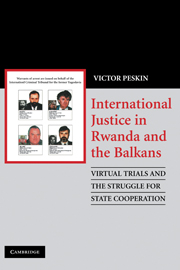 International Justice in Rwanda and the Balkans
International Justice in Rwanda and the Balkans Book contents
- Frontmatter
- Contents
- Maps and Timelines
- Acknowledgments
- Permissions
- Note on Pronunciation
- MAP 1 Map of the Former Yugoslavia
- MAP 2 Map of Rwanda
- PART I INTRODUCTION
- PART II THE BALKANS: STRATEGIES OF NON-COMPLIANCE AND INSTRUMENTS OF PRESSURE
- 2 Slobodan Milošević and the Politics of State Cooperation
- 3 International Justice and Serbia's Troubled Democratic Transition
- 4 Franjo Tuđman and the Politics of International Justice
- 5 The Politics of State Cooperation in Croatia's Democratic Era
- PART III RWANDA: VIRTUAL TRIALS, INTERNATIONAL JUSTICE, AND THE POLITICS OF SHAME
- PART IV CONCLUSION
- Bibliography
- Index
5 - The Politics of State Cooperation in Croatia's Democratic Era
Published online by Cambridge University Press: 05 September 2012
- Frontmatter
- Contents
- Maps and Timelines
- Acknowledgments
- Permissions
- Note on Pronunciation
- MAP 1 Map of the Former Yugoslavia
- MAP 2 Map of Rwanda
- PART I INTRODUCTION
- PART II THE BALKANS: STRATEGIES OF NON-COMPLIANCE AND INSTRUMENTS OF PRESSURE
- 2 Slobodan Milošević and the Politics of State Cooperation
- 3 International Justice and Serbia's Troubled Democratic Transition
- 4 Franjo Tuđman and the Politics of International Justice
- 5 The Politics of State Cooperation in Croatia's Democratic Era
- PART III RWANDA: VIRTUAL TRIALS, INTERNATIONAL JUSTICE, AND THE POLITICS OF SHAME
- PART IV CONCLUSION
- Bibliography
- Index
Summary
Introduction
The death of President Franjo Tuđman in December 1999 and the decisive electoral defeat of his Croatian Democratic Union (HDZ) party several weeks later marked a new era in Croatian politics. After a decade of authoritarian rule, Croatian citizens voted to take the country on a democratic course. The victory of a new center-left governing coalition also marked a turning point in the tumultuous relationship between Zagreb and the International Criminal Tribunal for the Former Yugoslavia (ICTY). After years of resistance, the government pledged to aid the tribunal in its probe of Croatian atrocities committed not only in Bosnia but in the so-called Homeland War, the nation's celebrated war of independence fought against Serbs on Croatian soil. Zagreb's pledge to cooperate with the Homeland War investigations was a major step forward for the tribunal, coming as it did after years of the state's refusal to countenance tribunal investigations of Croatian atrocities in this war. At the tribunal, officials were hopeful that Zagreb's promises would lead to the first indictments and trials of high-level Croatian generals suspected of ordering atrocities during the Homeland War. Now perhaps, the “trials of cooperation” between state and tribunal would become a thing of the past.
The democratic opening, optimists in The Hague and elsewhere hoped, could start a process of national introspection in partnership with the tribunal to confront the country's recent past.
- Type
- Chapter
- Information
- International Justice in Rwanda and the BalkansVirtual Trials and the Struggle for State Cooperation, pp. 119 - 148Publisher: Cambridge University PressPrint publication year: 2008


